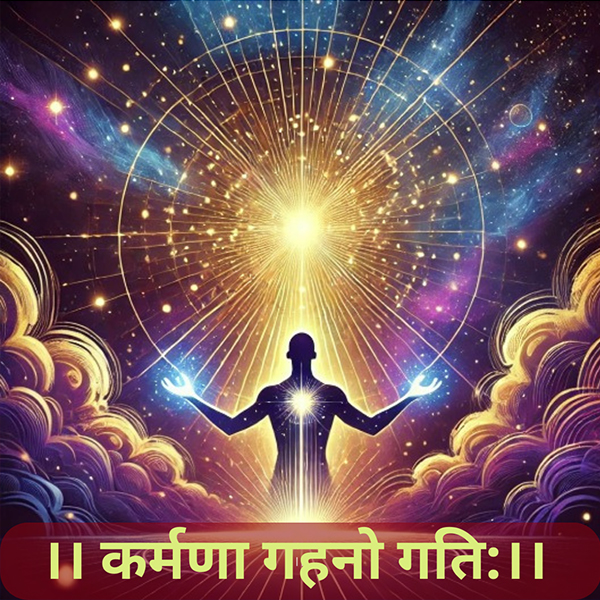
“The Unpredictable Cycle of Karma”
Understanding Action, Inaction, and the Profound Nature of Karma
In Chapter 4, Verse 17 of the Bhagavad Gita, Lord Krishna states :
कर्मणो ह्यपी बोद्धव्यं बोद्धव्यं च विकर्मण: |
अकर्मणश्च बोद्धव्यं गहना कर्मणो गति: ||
You must understand the nature of all three—recommended action, wrong action, and inaction. The truth about these is profound and difficult to understand.
Lord Krishna divides karma into three categories:
- Karma (action): Actions aligned with scriptures that regulate the senses and purify the mind.
- Vikarma (forbidden action): Actions prohibited by scriptures due to their detrimental impact on the soul.
- Akarma (inaction): Actions performed without attachment to results, done solely for the pleasure of the divine, free from karmic consequences.
This division forms the basis of understanding the intricate karmic cycle, which remains enigmatic to many, even after centuries of exploration.
A Modern Lens on the Karmic Cycle
The concept of karma originated in the Vedic tradition and evolved into the forefront philosophy of several Eastern cultures. Yet, the paradoxical nature of karma continues to puzzle people worldwide. On one hand, karma is seen as a universal law of justice—”as you sow, so shall you reap.” On the other, we often witness discrepancies, where the virtuous suffer and the wicked prosper.
This paradox arises due to a narrow interpretation of karma that ignores its deeper dynamics of synchronization, synthetization, and symbiosis:
- Synchronization: Karma is not an isolated event; it operates in harmony with the universal rhythm. Every action, thought, and intention aligns with the cosmic order, creating a ripple effect that impacts the past, present, and future simultaneously.
- Synthetization: The karmic cycle is the amalgamation of countless factors—choices, circumstances, and external influences. A single action is rarely independent; it is a synthesis of the doer’s intent, societal conditions, and even historical contexts.
- Symbiosis: Karma thrives in an ecosystem of mutual interdependence. The actions of one individual inevitably affect others, reinforcing the interconnectedness of all beings. This symbiotic relationship ensures the balance of the universe.
The Science of Karma
Modern science offers intriguing parallels to the ancient karmic philosophy. For instance:
- Einstein’s theory of relativity shows that time is not linear but relative, suggesting that karma’s impact might also transcend conventional timeframes.
- Newton’s law that every action has an equal and opposite reaction echoes the principle of karmic balance.
- The Butterfly Effect in chaos theory demonstrates how small actions can have profound, far-reaching consequences.
These scientific principles underscore the unpredictability of karma. A single action, though seemingly insignificant, could ripple across time and space, affecting countless lives.
Reinterpreting Karma with Modern Wisdom
Karma is often misunderstood as an individual burden or fate imposed by divine forces. In reality, it is a collaborative and evolving process influenced by:
- Social Conditioning: Our upbringing, environment, and societal norms shape our choices, often dictating our actions subconsciously.
- Collective Energy: The thoughts and intentions of others, past and present, contribute to the karmic web we navigate.
- Cosmic Balance: Karma is not punitive but corrective, designed to maintain universal equilibrium.
Lord Krishna’s revelation that karmaṇaḥ gahanā gatiḥ (the cycle of karma is profound) encourages us to look beyond superficial judgments of right and wrong.
Practical Insights for Navigating Karma
To harness the wisdom of the karmic cycle in daily life, consider the following steps:
- Act with Awareness (Synchronization): Align your actions with higher intentions. Meditate on whether your choices resonate with universal harmony and benefit others.
- Reflect on Influences (Synthetization): Recognize the factors shaping your decisions. Are your actions truly your own, or are they influenced by societal pressures or past experiences?
- Embrace Interdependence (Symbiosis): Acknowledge your role in the larger ecosystem. Every action, however small, impacts the collective consciousness. Strive to contribute positively.
- Let Go of Results: Practice akarma by acting selflessly. Dedicate your actions to a higher purpose, free from attachment to outcomes.
- Learn from the Past, Shape the Future: While karma reflects past deeds, it also offers an opportunity to redefine your path. Use each moment to rewrite your karmic script.
A New Vision of Karma
The cycle of karma, as described in the Bhagavad Gita, is more than a system of rewards and punishments. It is a dynamic interplay of synchronization, synthetization, and symbiosis that governs the universe.
Understanding karma through this lens empowers us to navigate life with greater wisdom and compassion. It transforms karma from a burden into an opportunity—a chance to align our actions with the divine rhythm, synthesize our inner and outer worlds, and live in symbiotic harmony with all of existence.
In the light of Krishna’s eternal teachings, we are reminded that the unpredictable nature of karma is not a source of fear but a call to conscious living. With every thought, word, and deed, we contribute to the magnificent tapestry of the cosmos.
इतिमस्तु ।।











